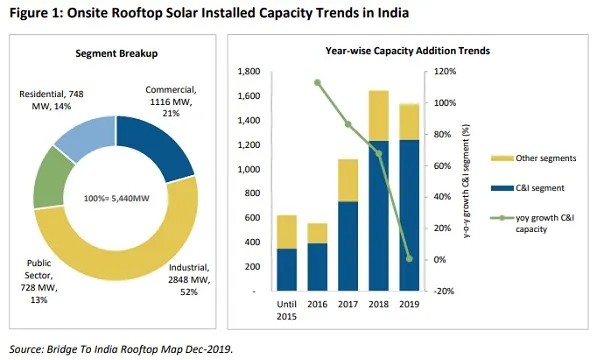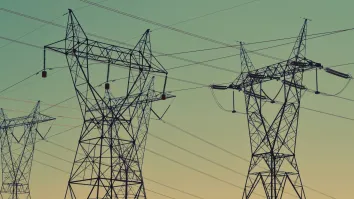
How India's commercial and industrial sector can drive rooftop solar adoption
Subsidies have allowed residential users to dominate rooftop solar installations.
Rising electricity demand and rising grid tariffs for commercial and industrial (C&I) customers are driving business users to rooftop solar in India, which is not only cleaner and cheaper but also gives them tariff certainty for 25 years, according to a report from JMK Research & Analytics and the Institute for Energy Economics and Financial Analysis (IEEFA).
According to co-author Jyoti Gulia, C&I users consume nearly half of the electricity generated in India, but only 3.5% of the power procured by the segment is from renewable sources. “C&I rooftop solar has vast potential, and already accounts for 70-80% of all the country’s rooftop solar installations,” Gulia said.
Different from other economies, residential users dominate India’s rooftop solar segment, as they are subsidised whereas while C&I consumers are levied an additional cross-subsidy surcharge leading to higher mains electricity tariffs, explained co-author Vibhuti Garg.
India’s rooftop solar market has, broadly, two business models – capex & opex. From the perspective of a consumer, capex is a self-financing model whilst opex is a third-party financing model. Opex accounted for nearly a third of all rooftop solar installations at end-2019.
With the falling equipment cost, the payback period for rooftop solar projects has also been gradually shortening. Currently, in a capex model, payback can be realised by a shorter duration of 3-4 years, whilst for an opex project the tariff rate is about $0.047 –0.053 (Rs3.5-4)/kWh, less than half the average of C&I grid tariffs prevalent across most states.
In the C&I segment itself, medium, small, and micro enterprises (MSMES) are expected to be the most likely to aggressively adopt solar in coming years.
MSMEs are the backbone of the Indian economy, contributing 6.1% of GDP and about 45% of total manufacturing output, Gulia noted. “Electricity costs are up to 50% of their total expenses, so cutting such costs via solar power sustainably improves their competitiveness in a big way,” she said
However, the report noted that two fundamental issues, namely financing and regulatory uncertainty, must be tackled to speed up adoption of rooftop solar. Distributed, domestic generation was noted to be a key solution to meet India’s energy security and energy needs.
Already, the government has planned some large-scale investments intended to drive this market. One of them is the Ministry of New and Renewable Energy’s Rooftop Phase II program that targets adding 18GW via incentives to distribution companies (discoms).
Under the recently issued Draft Electricity Amendment Act 2020, several progressive measures are also being planned for the renewable sector such as introducing a pan-India renewable purchase obligation (RPO) that will compel discoms and other large consumers to buy a certain percentage of the power they need from renewable energy sources.
However, the report warned that not every rooftop solar venture has been successful, as many small engineering, procurement, and construction (EPC) players have quit the market in the past year because they are unable to raise enough funding to expand their portfolio.
“Most of these players have a specific regional focus and any change in policy can make their business unviable. A diversified portfolio across different geographies is needed to stay afloat in this highly price-sensitive and competitive market,” Garg added.



















 Advertise
Advertise





